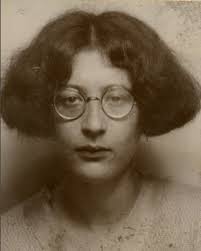Who are the prophets? Abraham Heschel and Simone Weil on paying attention
 Who are the prophets? If one reads the biblical accounts of the prophets it is clear to see that they are certainly an odd bunch. Their strange deeds line the pages of our scriptures. Isaiah walked through the streets naked. Jeremiah fastened a cattle yoke to his shoulders. Hosea married a woman he knew would be unfaithful and gave his children names like Lo-Ruhama, which means "unloved." Ezekiel ate a scroll and laid on his side for more than a year. Jonah spent three days in the belly of a whale and then begged God to kill him. Whatever they are, they are a strange batch of people.
Who are the prophets? If one reads the biblical accounts of the prophets it is clear to see that they are certainly an odd bunch. Their strange deeds line the pages of our scriptures. Isaiah walked through the streets naked. Jeremiah fastened a cattle yoke to his shoulders. Hosea married a woman he knew would be unfaithful and gave his children names like Lo-Ruhama, which means "unloved." Ezekiel ate a scroll and laid on his side for more than a year. Jonah spent three days in the belly of a whale and then begged God to kill him. Whatever they are, they are a strange batch of people.
Abraham Heschel describes the oddness of the prophets as a result of their peculiar form of vision.
The sort of crimes and even the amount of delinquency that fill the prophets with dismay do not go beyond that which we regard as normal, as typical ingredients of social dynamics. To us a single act of injustice--cheating in business, exploitation of the poor--is slight; to the prophets, a disaster. To us an injustice is injurious to the welfare of the people; to the prophets it is a deathblow to existence: to us, an episode; to them, a catastrophe, a threat to the world.
Their breathless impatience with injustice may strike us as hysteria. We ourselves witness continually acts of injustice, manifestations of hypocrisy, falsehood, outrage, misery, but we rarely grow indignant or overly excited. To the prophets even a minor injustice assumes cosmic proportions. (A J Heschel, The Prophets, New York: HarperCollins, 2001, p. 4)
What adds to our strange imagination of the prophets is that they are perceived as heroes of the faith. They are not just peculiar, they have been granted with special gifts. Though they are often treated harshly within their own contexts, our common view of the characters in the narrative of scripture treats the prophets as special individuals, exceptionally faithful to God, entrusted with the extraordinary task of speaking the Word of God. The problem with this view of the prophets is that it disables us everyday people from ever having our eyes opened. It safeguards us from the task of ever having to do any strange deeds in the manner of the prophets.
It is curious that in some Christian circles it is taught that prophecy ended with the last pages of the New Testament. And I can see how someone could get this idea. I mean, surely, in our current age God doesn't need peculiar people to speak the truth of God. That would just be too disruptive. Except, I would argue, that this disruption is exactly what the calling of the prophet was all about, disrupting our everyday lives for the the sake of condemning the normality of injustice.
So, what would a modern day prophet look like? There are numerous examples. One example is the French philosopher, Simone Weil. Though she lived at the turn of the last century, her work and life has had a major impact on my own view of the world. Like the prophets of scripture, her life was not only spent with her eyes wide open to the injustice around her, but she also challenged others to have their eyes opened. An often quoted phrase of hers speaks of her prophetic calling: "Attention is the rarest and purest form of generosity." She was a Christian, a mystic, an activist, a pacifist, an anarchist, and--I would add--a modern day prophet.
What Simone Weil should teach us about the life of the prophets is that they are not just specially gifted people. They are people who remind us that God has called us all to have our eyes opened. God is not just calling us to perform some acts of charity, but to stand up, open our eyes, and pay attention to the needs of those around us.
What Abraham Heschel, Simone Weil, and the prophets of old teach us is that learning to live life faithfully in response to God requires that we first learn to pay attention. Then, we must act. We must act, not only to address what we see, but to address a world filled with others who still refuse to pay attention.
There is a documentary out about her titled An Encounter with Simone Weil, filmed by Julia Haslett. I have not yet seen it, but I'm hoping to create a meet-up group soon to watch and discuss the film, along with organize a group to engage reading of some of her work. Please let me know if you would be interested.
[embed]https://www.youtube.com/watch?v=jOCE_d2R5lw[/embed]

